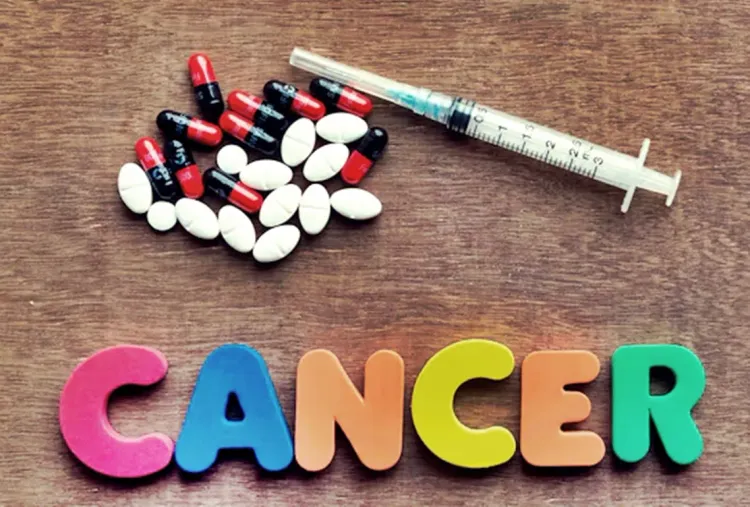Increasing Concern Over Alcohol-Linked Cancers in India, Experts Warn

Synopsis
Key Takeaways
- Alcohol is a Group 1 carcinogen associated with over 20 types of cancer.
- Acetaldehyde produced from alcohol harms DNA and proteins.
- Regular screenings are vital, especially for high-risk groups.
- Alcohol consumption weakens the immune system.
- Early detection can significantly improve survival rates.
New Delhi, Feb 17 (NationPress) Health professionals highlighted that alcohol-related cancers are becoming a significant issue in India, especially as the World Health Organization (WHO) recently advocated for conspicuous health warning labels on alcoholic products.
The WHO classifies alcohol as a toxic, psychoactive, and dependence-forming substance, and it has been categorized as a Group 1 carcinogen by the International Agency for Research on Cancer. This classification indicates the highest level of risk, alongside substances like asbestos, radiation, and tobacco.
“The risk of cancer increases with alcohol consumption, with over 20 different types of cancers linked to its use,” stated Dr. (Prof) Puneet Garg, a Vascular Interventional Radiologist and Endovascular Surgeon at Safdarjung Hospital, New Delhi, during an IANS interview.
The cancers most commonly associated with alcohol include those of the mouth, throat, esophagus, stomach, colon, rectum, and pancreas. It is also linked to breast cancer in women and prostate cancer in men.
“In India, there is a rising concern regarding cancers related to alcohol. The metabolism of alcohol produces acetaldehyde—a hazardous compound capable of damaging DNA and proteins—leading to mutations that can trigger cancer development. Furthermore, alcohol consumption can hinder the body's ability to absorb vital nutrients like folate and vitamins A, C, D, and E, which are essential for cell health and cancer prevention,” explained Dr. Taraprasad Tripathy, Assistant Professor at the All India Institute of Medical Sciences in Bhubaneswar, Odisha, during an IANS interview.
As a well-recognized carcinogen, alcohol significantly contributes to the global cancer burden. The WHO reports that nearly 4% of all cancers diagnosed worldwide are attributable to alcohol use.
A recent study published in the journal Lancet estimated that alcohol consumption was responsible for approximately 62,100 new cancer cases in India in 2020.
Recently, US Surgeon General Vivek Murthy also recommended incorporating cancer warnings on alcoholic beverages to address the increasing instances of breast, liver, and colon cancers. Such warnings can help consumers make informed choices and heighten awareness regarding the health risks associated with alcohol.
Experts noted that prolonged alcohol consumption can also compromise the immune system, diminishing its ability to detect and eliminate cancerous cells. Tripathy elaborated that different types of cancers linked to alcohol exhibit unique early warning signs.
Signs such as persistent mouth sores, unexplained bleeding, a lump or thickening in the cheek, difficulties in swallowing, or a sore throat that does not improve can be indicative of oral and pharyngeal cancer.
For oesophageal cancer, symptoms may include challenges in swallowing, chest pain, unintended weight loss, chronic cough, or voice changes. Meanwhile, liver cancer can present symptoms like abdominal swelling, jaundice (yellowing of the skin and eyes), unexplained weight loss, loss of appetite, and fatigue.
A lump in the breast or underarm, alterations in breast shape or size, skin dimpling, or nipple discharge may signal breast cancer. The experts emphasized the urgency of early cancer detection to enhance treatment outcomes.
With modern treatments available, early detection can significantly improve chances for recovery and survival. However, “if diagnosed late and neglected, these cancers can metastasize to other body parts. Such metastases are challenging to remove through surgery and chemotherapy,” noted Garg.
He further stated that in advanced stages, cancer cells can overwhelm the body’s immune system and damage critical organs such as the brain, liver, heart, kidneys, and lungs, which are essential for physiological functioning.
Experts also called for routine screenings, especially for individuals at high risk, and emphasized the need for immediate medical attention for unusual symptoms.
“Reducing alcohol intake is a proactive strategy to mitigate the risk of developing these cancers. The WHO stresses that no level of alcohol consumption is safe, as even moderate intake elevates cancer risk,” Tripathy concluded.









